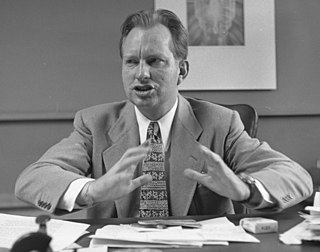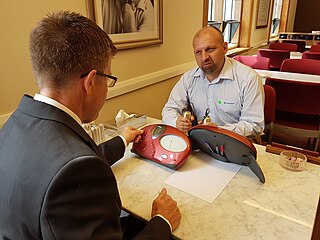
Lafayette Ronald Hubbard was an American author and the founder of Scientology. A prolific writer of pulp science fiction and fantasy novels in his early career, in 1950 he authored Dianetics: The Modern Science of Mental Health and established organizations to promote and practice Dianetics techniques. Hubbard created Scientology in 1952 after losing the intellectual rights to his literature on Dianetics in bankruptcy. He would lead the Church of Scientology, variously described as a cult, a new religious movement, or a business, until his death in 1986.

Free Zone, Freezone, and Independent Scientology are umbrella terms for the groups, organizations, and individuals who practice Scientology beliefs and practices independently of the Church of Scientology (COS). Such practitioners range from those who closely adhere to the original teachings of Scientology's founder L. Ron Hubbard, to those who have adapted practices far from COS beliefs and practices.

The Church of Scientology maintains a wide variety of beliefs and practices. The core belief holds that a human is an immortal, spiritual being (thetan) that is resident in a physical body. The thetan has had innumerable past lives, some of which, preceding the thetan's arrival on Earth, were lived in extraterrestrial cultures. Based on case studies at advanced levels, it is predicted that any Scientologist undergoing auditing will eventually come across and recount a common series of past-life events.

In Scientology, Operating Thetan (OT) is a state of complete spiritual freedom in which one is a "willing and knowing cause over life, thought, matter, energy, space and time". The Church of Scientology offers eight "levels" of OT, each level costing thousands of US dollars. The OT levels are confidential and not revealed to Scientologists until they reach the third Operating Thetan level. In practice, the objective of these levels is to remove "body thetans" which are "confused, disembodied souls from other planets who have attached themselves to us".

David Miscavige is the second and current leader of the Church of Scientology. His official title within the organization is Chairman of the Board of the Religious Technology Center (RTC), a corporation that controls the trademarks and copyrights of Dianetics and Scientology. He is also referred to within the Scientology organization as "DM," "COB" and "Captain of the Sea Org."

Auditing, also known as processing, is the core practice of Scientology. Scientologists believe that the role of auditing is to improve a person's abilities and to reduce or eliminate their neuroses. The Scientologist is asked questions about past events while holding two metal cylinders attached to an electrical resistance meter (galvanometer) with a dial. The term "auditing" was coined by L. Ron Hubbard in his 1950 book Dianetics: The Modern Science of Mental Health, which describes the process. Auditing uses techniques from hypnosis that are intended to create dependency and obedience in the subject.

The Church of Scientology is a group of interconnected corporate entities and other organizations devoted to the practice, administration and dissemination of Scientology, which is variously defined as a cult, a business, or a new religious movement. The movement has been the subject of a number of controversies, and the Church of Scientology has been described by government inquiries, international parliamentary bodies, scholars, law lords, and numerous superior court judgements as both a dangerous cult and a manipulative profit-making business. In 1979, several executives of the organization were convicted and imprisoned for multiple offenses by a U.S. Federal Court. The Church of Scientology itself was convicted of fraud by a French court in 2009, a decision upheld by the supreme Court of Cassation in 2013. The German government classifies Scientology as an unconstitutional sect. In France, it has been classified as a dangerous cult. In some countries, it has attained legal recognition as a religion.

Scientology ethics and justice are a collection of policies and procedures by L. Ron Hubbard and used by the Church of Scientology. Scientology defines ethics as "the actions an individual takes on himself", and justice as "the action taken on the individual by the group when he fails to take these actions himself". The body of writings include techniques and policies of moral choices, and the rules of conduct to be followed by scientologists.
When the individual fails to put in his own ethics, the group takes action against him and this is called justice.
The Commodore's Messenger Organization (CMO) is a management unit within the Sea Org, the unincorporated paramilitary wing of the Church of Scientology. CMO oversees the various other Church of Scientology organizations.

Ronald Edward "Ron" DeWolf, also known as "Nibs" Hubbard, was the eldest child of Scientology's founder L. Ron Hubbard by his first wife Margaret Louise Grubb. He is known for having been highly critical of his father and of the Church of Scientology. In his opinion, Scientology was a cult that existed to make money.

History of Dianetics and Scientology begins around 1950. During the late 1940s, L. Ron Hubbard began developing a mental therapy system which he called Dianetics. Hubbard had tried to interest the medical profession in his techniques, including the Gerontological Society, the Journal of the American Medical Association, and the American Journal of Psychiatry, but his work was rejected for not containing sufficient evidence of efficacy to be acceptable.

A Piece of Blue Sky: Scientology, Dianetics and L. Ron Hubbard Exposed is a 1990 book about L. Ron Hubbard and the development of Dianetics and Scientology, authored by British former Scientologist Jon Atack. It was republished in 2013 with the title Let's sell these people A Piece of Blue Sky: Hubbard, Dianetics and Scientology. The title originates from a quote of Hubbard from 1950; an associate of Hubbard's noted him saying that he wanted to sell potential members "a piece of blue sky".

This is a Timeline of Scientology and its forerunner Dianetics, particularly its foundation and development by author L. Ron Hubbard as well as general publications, articles, books and other milestones.

OT VIII or OT 8 is the highest current auditing level in Scientology. OT VIII is known as "The Truth Revealed" and was first released to select high-ranking public Scientologists in 1988, two years after the death of Scientology's founder, L. Ron Hubbard. OT VIII is only delivered to members of the Church of Scientology in one place—aboard the organization's private cruise ship, the Freewinds, and is additionally available from independent Scientology groups. There are a few advanced auditors that are able to deliver the level to those who meet the prerequisites.

The Bridge to Total Freedom, also known as the Classification, Gradation and Awareness Chart, is Scientology's primary action plan and road map to guide a person through the sequential steps to attain Scientology's concept of spiritual freedom. Displayed in every Scientology organization as an enormous poster using red ink, the comprehensive chart contains almost every service available within Scientology. All steps on the Bridge cost money.

The relationship between Scientology and religious groups is very complex. While Scientology claims that it is fully compatible with all existing major world religions and that it does not conflict with them or their religious practices, there are significant contradictions between Scientology and most religions, especially the major monotheistic religions. Members are not allowed to engage in other similar mental therapies or procedures, religious or otherwise.
Jenna Miscavige Hill is an American former Scientologist. After leaving the Church of Scientology in 2005, she has become an outspoken critic of the organization. She had been a third-generation Scientologist, the granddaughter of Ron Miscavige Sr., the daughter of Elizabeth "Bitty" Miscavige and Ron Miscavige Jr. and the niece of current Scientology leader David Miscavige. Her book Beyond Belief: My Secret Life Inside Scientology and My Harrowing Escape, recounting her experience growing up and living within the Scientology movement, was published by HarperCollins in 2013. She now runs a website which she co-founded with other ex-Scientologists which provides support and discussion for people either in the church or who have left.

The intersection of Scientology and abortion has a controversial history which began with Scientology founder L. Ron Hubbard's discussion of abortion in his 1950 book Dianetics: The Modern Science of Mental Health. Hubbard wrote in Dianetics that abortion and attempts at abortion could cause trauma to the fetus and to the mother in both spiritual and physical ways. Scientologists came to believe that attempted abortions could cause traumatic experiences felt by the fetus, which would later be remembered as memories referred to in Scientology as "engrams". In the Scientology technique called Auditing, Scientologists are frequently queried regarding their sexual feelings and behaviors. These questions about Scientologists' sexual behavior are often posed to members during "security checks", a specific form of auditing sessions where individuals are required to document their divergence from the organization's ethics. One of the questions asked in these security checks is, "Have you ever been involved in an abortion?".

The Church of Scientology network operates as a multinational conglomerate of companies with personnel, executives, organizational charts, chains of command, policies and orders.
Religious Technology Center is the most powerful executive organization within the Scientology empire, and its current chairman, David Miscavige, is widely recognized as the effective head of the church.







